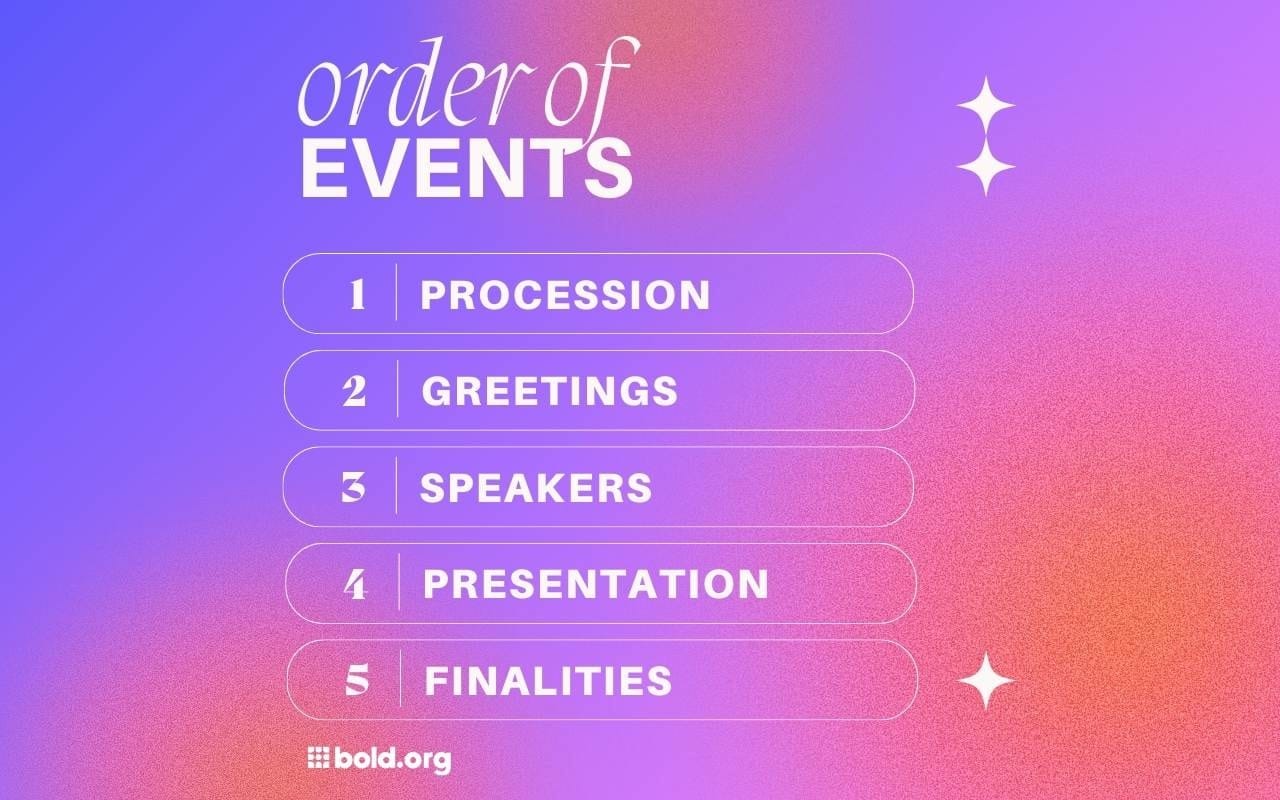How Long Is a Graduation Ceremony?


The journey to commencement weekend is such an uphill battle. Between muddy exam waters, final project completion and sacrificing your sanity, I know what it’s like to be this close to giving up. However, once you’ve made it all the way to graduation, give yourself a round of applause; you did it!
Today’s article is dedicated to upcoming graduating students everywhere—whether you’re undergraduate students, master’s students, doctoral candidates, or even high school students, you’ve made it to the finish line, and now it’s time to celebrate!
I’ll be going over what a graduation ceremony is, how long it is, how to prepare for graduation, and more. Follow me, and let me guide you through a successful and memorable graduation ceremony!
Heading off to college soon? Create an account on Bold.org and begin applying for scholarships today to help avoid falling into student debt.
Get Matched to Thousands of Scholarships
Create your Bold.org profile to access thousands of exclusive scholarships, available only on Bold.org.
Create Free ProfileWhat Is a Graduation Ceremony?
The graduation ceremony, also known as commencement, is the traditional awarding of degrees. Today, college ceremonies are often held in large venues, with students dressed in caps and gowns to commemorate their degree completion.
Graduation Ceremonies: How Long?
A typical graduation ceremony lasts anywhere between 90 minutes to 3 hours. Now, these are time approximations; each school will have their own set time length for the ceremony. Check out these three real-world examples:
- Example 1: Brown University's 2024 Master's Ceremony took about 2.5 hours.
- Example 2: University of Virginia's 2024 Multicultural Graduation Ceremony took 2 hours.
- Example 3: Saint Louis' University's 2024 department-specific commencement ceremonies each took about 1.5 hours.
Throughout this time frame, students, faculty, and staff have time to give speeches, prepare readings, say prayers, and even add entertainment through songs and other forms of musical support.
You want to make sure you do your due diligence and find out how long the ceremony will be according to your school’s schedule. Better to be over-prepared than under, especially on a special day like this one.

Purpose of a Graduation Ceremony
Graduation ceremonies mark the end of an academic journey and celebrate students' achievements, transitioning them from student life to the professional world. These ceremonies bring together students, families, faculty, and staff to reflect on the educational journey, recognize academic excellence, and inspire future aspirations.
Most importantly, these ceremonies instill a sense of pride and accomplishment, celebrating the sacrifices and efforts that led to this moment. They create lasting memories and connections that will be cherished for years to come.
Browse these graduation gift ideas to find inspiration for a gift for your friend or loved one who is graduating!

How to Prepare for Graduation
For some students, the countdown to graduation begins on the very first day of freshman year. Yet, years of waiting for this day don’t actually prepare you for it, so I’ve come up with some ways to help you get ready!
- Confirm Graduation Requirements: Once you have your official graduation date, make sure you have completed all necessary coursework and requirements to graduate.
- Order Graduation Attire: Purchase or make arrangements to rent your graduation gown, cap, tassel, and any other required attire in advance.
- RSVP for the Ceremony: Confirm your attendance and those who need guest tickets for the graduation ceremony.
- Plan Your Schedule: Coordinate with family and friends and plan your schedule for the day. Get a head count of how many guests will be attending the celebration, including arrival time and any other post-graduation celebrations.
- Prepare Your Speech (if necessary): If you are giving a speech or presentation during the ceremony, practice and prepare in advance.
- Gather Necessary Documents: Know your ceremony details through and through. And if necessary, bring any required documents, such as identification or graduation paperwork, to the ceremony.
- Arrive Early: Getting to the venue early will not only ensure seats for your party but also reduce the stress of last-minute problems. Plus, you also get the chance of nabbing floor-level seats!
- Celebrate Your Achievements: Take time to reflect on your accomplishments and soak it all in. You did it; you’ve finally made it, and you deserve to celebrate with loved ones all day long!
Tip: Keep the little things in mind like: prohibited items, the use of mobile devices during the ceremony, if the school has a clear bag policy, accessibility resources, and all other important details that can disrupt the day!
After graduation, many undergraduate students will become graduate students in the following academic year. Take a look at these exclusive scholarships for graduate students to start saving up for those graduate school expenses!
Graduation Ceremony: Order of Events
Every graduation's order of events will differ slightly, but for the most part, they all consist of the same key components. Let’s go through the typical order of events for a graduation ceremony so you know what to expect on the big day:
- Procession – The processional part of the order of events involves music, the entrance of the graduating class, or the singing of the national anthem.
- Greetings – Introductions from the principal, the board, and a class representative will kick off the ceremony.
- Speakers – Inspirational speeches from student speakers (like the class president), guest speaker(s), and even a former student will lead the crowd through the ceremony.
- Presentation – Each student will walk to the podium to receive their diplomas.
- Finalities – Faculty members will wrap up the event by saying their last words of encouragement to students.
While this is just an outline of the day's order of events, this is what is to be expected on the day of the ceremony. There's a chance that each school may have its own traditions, so you’ll receive a formal graduation program that will help you follow along.
You've just graduated! Now what? Check out our guide on what to do after college to get a quick but detailed look into life after university.

When to Expect Graduation Ceremonies
Graduation occurs in three main seasons: spring, summer, and fall. Spring is the most popular, with ceremonies typically held throughout May. If you're graduating in the spring, your ceremony is likely soon, so it's time to prepare.
Each university sets its own dates, with some ceremonies in early May and others later in the month. For exact dates, visit campus resources like the registrar's office or academic counselors.
Summer Ceremonies
Summer graduates, you're up next! A summer commencement ceremony is just as incredible and special for graduating classes everywhere. Summer students can expect their ceremonies to be held in July, which is right in the middle of summer. And since spring term students have left campus, summer graduates can also expect smaller crowds, but that just makes your graduation more intimate.
Fall Ceremonies
And last, but certainly not least, those graduating in the fall should expect their fall commencement ceremony to be held in December. I know it's a little too early in the year to think that far ahead, but December is one of the busiest times of the year, so it's important to advise your family and friends of your official graduation date as soon as you can.
Wondering what to write on a graduation card? Check out our graduation card guide to help you generate ideas!

Frequently Asked Questions About Graduation Ceremonies
What is the difference between a graduation and commencement ceremony?
A graduation ceremony marks the official completion of an academic program, where students are awarded their degrees. A commencement ceremony is the celebratory event recognizing the achievements of the graduates, involving speeches, awards, and the distribution of degrees.
Note: Convocation ceremonies are also a term that may come up, and they may be used interchangeably with commencement or to refer more specifically to a ceremony in which each student individually crosses the stage to receive their diploma.
Can graduates personalize their graduation caps or gowns?
Some schools allow eligible graduates to personalize their caps but not their gowns. However, other schools do not. Please make sure that you check your school’s graduation and safety guidelines before giving your cap and/or gown any décor. Failure to adhere to their rules can lead to harsh consequences, and they may need to leave campus.
How many guests can each graduate bring to the university commencement ceremony?
Depending on the school, the number of guest tickets or “invitations” to students' families can be limited. Some institutions offer as few as two per student, others five, and others more. It’s important to know this information ahead of time so everyone wanting to attend your event can be aware.
Interested in learning more? Check out our scholarship blog to read more about everything you need to know pertaining to college!